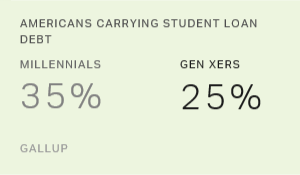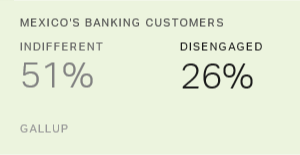Story Highlights
- Financial worries are greater among Americans who carry debt
- Americans in debt are more likely to try cutting costs or boosting income
This is the first article in a two-part series.
What happens to people when they go into debt? Specifically, what happens to them psychologically -- and how does debt affect their behavior?
Carrying debt has many potential consequences. Among these is increased anxiety over one's ability to cover a variety of expenses. These concerns may lead people to try ways to reduce expenses or generate more income. Not surprisingly, certain financial worries are substantially greater among Americans who carry debt compared with those who don't.
Financial Worries
Significantly more Americans who carry at least some debt say they are "very worried" about not having enough for retirement (27%) compared with those who have no debt (18%). Significantly more Americans who carry debt also say they are "very worried" about not having enough money to pay off their debt (17%) than those who are debt-free (11%).
What is striking, however, are the areas in which those who carry debt are not more worried than those who don't. Specifically, those who carry debt are no more worried than those who are debt-free about not being able to maintain the standard of living they enjoy (16% very worried versus 12% very worried); not being able to pay medical costs in the event of a serious illness or accident (25% very worried versus 22% very worried); and not having enough money to pay their normal monthly bills (13% very worried versus 10% very worried).
And those who carry debt are no more worried than those who are debt-free about not being able to pay their rent, mortgage or other housing costs (10% very worried versus 11% very worried); not being able to make the minimum payments on their credit cards (5% very worried versus 7% very worried); not being able to pay medical costs for normal healthcare (16% very worried for both groups); and not being able to pay for their children's college (17% very worried for both groups).
Carrying debt does not, by itself, appear to have much of an impact on Americans' financial worries. It's possible that Americans have become inured to consumer debt and accept it as an essential component of modern life.
Financial worries are also substantially greater among Americans who say they don't have enough money to live comfortably than those who feel they do have enough. At the top of the worry lists for both groups are "not being able to pay medical costs in the event of a serious illness or accident" and "not having enough for retirement." Both groups are least worried about "not being able to make the minimum payments on their credit cards."
The differences are in the percentages within each group who are very worried about keeping their commitments. Though 13% of those who say that they do have enough money to live comfortably are very worried about not being able to pay medical costs in the event of a serious illness or accident, almost half of those who don't think they have enough to live comfortably are very worried (45%).
The same pattern emerges on every item: Significantly more people who say they do not have enough money to live comfortably are very worried than those who do have enough to live comfortably. On eight of the nine items included, the difference between the "haves" and the "have-nots" is 20 percentage points or more. And though just 1% of the "haves" are very worried about not being able to make the minimum payments on their credit cards, 15% of the "have-nots" are very worried.
| Carry debt% | Do not carry debt% | Have enough money to live comfort-ably% | Do not have enough money to live comfort-ably% | Overall% | |||||||||||||||||||||||||||||||||||||||||||||||||||||||||||||||||||||||||||||||||||||||||||||||
|---|---|---|---|---|---|---|---|---|---|---|---|---|---|---|---|---|---|---|---|---|---|---|---|---|---|---|---|---|---|---|---|---|---|---|---|---|---|---|---|---|---|---|---|---|---|---|---|---|---|---|---|---|---|---|---|---|---|---|---|---|---|---|---|---|---|---|---|---|---|---|---|---|---|---|---|---|---|---|---|---|---|---|---|---|---|---|---|---|---|---|---|---|---|---|---|---|---|---|---|
| Not being able to pay medical costs in the event of a serious illness or accident |
25 | 22 | 13 | 45 | 24 | ||||||||||||||||||||||||||||||||||||||||||||||||||||||||||||||||||||||||||||||||||||||||||||||
| Not having enough for retirement | 27 | 18 | 11 | 46 | 23 | ||||||||||||||||||||||||||||||||||||||||||||||||||||||||||||||||||||||||||||||||||||||||||||||
| Not having enough money to pay for their children's college |
17 | 17 | 8 | 33 | 17 | ||||||||||||||||||||||||||||||||||||||||||||||||||||||||||||||||||||||||||||||||||||||||||||||
| Not being able to pay medical costs for normal healthcare |
16 | 16 | 7 | 32 | 16 | ||||||||||||||||||||||||||||||||||||||||||||||||||||||||||||||||||||||||||||||||||||||||||||||
| Not having enough money to pay off their debt |
17 | 11 | 5 | 34 | 15 | ||||||||||||||||||||||||||||||||||||||||||||||||||||||||||||||||||||||||||||||||||||||||||||||
| Not being able to maintain the standard of living they enjoy |
16 | 12 | 4 | 32 | 14 | ||||||||||||||||||||||||||||||||||||||||||||||||||||||||||||||||||||||||||||||||||||||||||||||
| Not having enough money to pay their normal monthly bills |
13 | 10 | 3 | 28 | 12 | ||||||||||||||||||||||||||||||||||||||||||||||||||||||||||||||||||||||||||||||||||||||||||||||
| Not being able to pay their rent, mortgage or other housing costs |
10 | 11 | 3 | 26 | 11 | ||||||||||||||||||||||||||||||||||||||||||||||||||||||||||||||||||||||||||||||||||||||||||||||
| Not being able to make the minimum payments on their credit cards |
5 | 7 | 1 | 15 | 6 | ||||||||||||||||||||||||||||||||||||||||||||||||||||||||||||||||||||||||||||||||||||||||||||||
| Sorted by % very worried overall | |||||||||||||||||||||||||||||||||||||||||||||||||||||||||||||||||||||||||||||||||||||||||||||||||||
| Gallup | |||||||||||||||||||||||||||||||||||||||||||||||||||||||||||||||||||||||||||||||||||||||||||||||||||
Taking Action to Cut Costs and Generate Income
Americans who carry debt are significantly more likely to say they have engaged in a variety of actions to cut costs or generate income than Americans who are debt-free. At the top of the list for both groups are putting off a major purchase and putting off buying a car. But following close behind, 20% of those who carry debt have sold some of their possessions to make ends meet.
Least common actions for both groups are putting off marriage, forgoing a job they would otherwise have accepted and moving in with family members. None of these actions differed significantly between the two groups.
What is notable is how often Americans who are debt-free engage in these same behaviors, possibly illustrating the broader effects of the current economic climate. More than one-third of those who are debt-free say they put off a major purchase (35%), and almost one-quarter put off buying a car (24%). Fourteen percent say they have sold some of their possessions to make ends meet. Almost half engaged in at least one of the 10 activities included in the survey (48%).
However, these percentages pale in comparison to Americans who carry some debt. More than four in 10 of those who carry some debt say they put off a major purchase (46%), and more than three in 10 put off buying a car (31%). Sixty-three percent of debt-carrying Americans have engaged in at least one of the 10 included actions while just less than half of those who are debt-free have done so (48%).
Americans who say they do not have enough money to live comfortably are significantly more likely to have engaged in the 10 cost-cutting or income-boosting actions than Americans who say they do have enough. At the top of the list for both groups are putting off a major purchase and putting off buying a car. Least common actions for both groups are putting off marriage, forgoing a job they would otherwise have accepted and moving in with family members.
One-third of those who say that they do not have enough money to live comfortably sold some of their possessions to make ends meet. And 77% of these Americans engaged in at least one of the 10 included actions.
A surprisingly high percentage of Americans who say they do have enough money to live comfortably also engage in some of these behaviors. More than three in 10 say they put off a major purchase (31%), and more than one in five put off buying a car (21%). Ten percent say they sold some of their possessions to make ends meet.
| Carry debt% | Do not carry debt% | Have enough money to live comfort-ably% | Do not have enough money to live comfort-ably% | Overall% | |||||||||||||||||||||||||||||||||||||||||||||||||||||||||||||||||||||||||||||||||||||||||||||||
|---|---|---|---|---|---|---|---|---|---|---|---|---|---|---|---|---|---|---|---|---|---|---|---|---|---|---|---|---|---|---|---|---|---|---|---|---|---|---|---|---|---|---|---|---|---|---|---|---|---|---|---|---|---|---|---|---|---|---|---|---|---|---|---|---|---|---|---|---|---|---|---|---|---|---|---|---|---|---|---|---|---|---|---|---|---|---|---|---|---|---|---|---|---|---|---|---|---|---|---|
| Put off some other major purchase, such as a vacation, home improvement project or major appliances |
46 | 35 | 31 | 61 | 42 | ||||||||||||||||||||||||||||||||||||||||||||||||||||||||||||||||||||||||||||||||||||||||||||||
| Put off buying a car | 31 | 24 | 21 | 42 | 28 | ||||||||||||||||||||||||||||||||||||||||||||||||||||||||||||||||||||||||||||||||||||||||||||||
| Put off furthering their education | 21 | 16 | 14 | 28 | 19 | ||||||||||||||||||||||||||||||||||||||||||||||||||||||||||||||||||||||||||||||||||||||||||||||
| Sold some of their possessions to make ends meet |
20 | 14 | 10 | 33 | 18 | ||||||||||||||||||||||||||||||||||||||||||||||||||||||||||||||||||||||||||||||||||||||||||||||
| Took a job they would not have taken otherwise |
17 | 12 | 9 | 26 | 15 | ||||||||||||||||||||||||||||||||||||||||||||||||||||||||||||||||||||||||||||||||||||||||||||||
| Not bought a house or apartment | 18 | 9 | 11 | 21 | 14 | ||||||||||||||||||||||||||||||||||||||||||||||||||||||||||||||||||||||||||||||||||||||||||||||
| Put off having children | 11 | 10 | 7 | 19 | 11 | ||||||||||||||||||||||||||||||||||||||||||||||||||||||||||||||||||||||||||||||||||||||||||||||
| Moved in with their parents or other relatives |
10 | 9 | 6 | 16 | 10 | ||||||||||||||||||||||||||||||||||||||||||||||||||||||||||||||||||||||||||||||||||||||||||||||
| Did not take a job they would have taken otherwise |
10 | 7 | 5 | 15 | 9 | ||||||||||||||||||||||||||||||||||||||||||||||||||||||||||||||||||||||||||||||||||||||||||||||
| Put off getting married | 8 | 10 | 5 | 16 | 9 | ||||||||||||||||||||||||||||||||||||||||||||||||||||||||||||||||||||||||||||||||||||||||||||||
| Percentage engaged in at least one activity |
63 | 48 | 46 | 77 | 57 | ||||||||||||||||||||||||||||||||||||||||||||||||||||||||||||||||||||||||||||||||||||||||||||||
| Sorted by % Yes Overall | |||||||||||||||||||||||||||||||||||||||||||||||||||||||||||||||||||||||||||||||||||||||||||||||||||
| Gallup | |||||||||||||||||||||||||||||||||||||||||||||||||||||||||||||||||||||||||||||||||||||||||||||||||||
Americans who do not have enough money to live comfortably engage in 2.8 actions, on average, of the 10 actions studied, while those who do have enough money to live comfortably engage in less than half that amount (1.2 actions). More than twice as many "haves" (54%) have engaged in none of the actions compared with the "have-nots" (23%).
In both groups, roughly equal percentages of people have engaged in one or two of the activities. But more than twice as many of those who say they don't have enough money to live comfortably (32%) have engaged in three to five of the behaviors compared with those who say they do have enough money to live comfortably (15%). The same pattern holds true for those who have engaged in six or more of the behaviors: 15% of the "haves" engaged in six or more behaviors compared with 4% of the "have-nots."
| Carry debt | Do not carry debt | Have enough money to live comfortably | Do not have enough money to live comfortably | Overall | |||||||||||||||||||||||||||||||||||||||||||||||||||||||||||||||||||||||||||||||||||||||||||||||
|---|---|---|---|---|---|---|---|---|---|---|---|---|---|---|---|---|---|---|---|---|---|---|---|---|---|---|---|---|---|---|---|---|---|---|---|---|---|---|---|---|---|---|---|---|---|---|---|---|---|---|---|---|---|---|---|---|---|---|---|---|---|---|---|---|---|---|---|---|---|---|---|---|---|---|---|---|---|---|---|---|---|---|---|---|---|---|---|---|---|---|---|---|---|---|---|---|---|---|---|
| None | 37% | 52% | 54% | 23% | 43% | ||||||||||||||||||||||||||||||||||||||||||||||||||||||||||||||||||||||||||||||||||||||||||||||
| One or two | 32% | 25% | 28% | 30% | 29% | ||||||||||||||||||||||||||||||||||||||||||||||||||||||||||||||||||||||||||||||||||||||||||||||
| Three to five | 23% | 17% | 15% | 32% | 21% | ||||||||||||||||||||||||||||||||||||||||||||||||||||||||||||||||||||||||||||||||||||||||||||||
| Six or more | 8% | 7% | 4% | 15% | 8% | ||||||||||||||||||||||||||||||||||||||||||||||||||||||||||||||||||||||||||||||||||||||||||||||
| Average number of activities | 1.9 | 1.4% | 1.2 | 2.8 | 1.7 | ||||||||||||||||||||||||||||||||||||||||||||||||||||||||||||||||||||||||||||||||||||||||||||||
| Gallup | |||||||||||||||||||||||||||||||||||||||||||||||||||||||||||||||||||||||||||||||||||||||||||||||||||
These results make this clear: Americans who feel they don't have enough money to live comfortably experience substantially greater financial worry and engage in cost-cutting or income-generating behaviors at a significantly higher rate than Americans who feel they do have enough money to live comfortably. Carrying debt can exacerbate that perception. But on its own, carrying debt does not seem to lead to greater financial worries for Americans. Though debt is an integral and expected part of most Americans' day-to-day experience, it does carry consequences that can have a meaningful impact on people's lives.
The second article in this series looks at generational differences in attitudes toward debt and the overall implications of debt in America.
Survey Methods
Results of this Gallup Panel survey are based on telephone interviews conducted Aug. 6-Sept. 10, 2015, with a random sample of 3,010 adults, aged 18 and older, living in all 50 U.S. states and the District of Columbia.
For results based on the total sample of national adults, the margin of sampling error is ±4 percentage points at the 95% confidence level.
Interviews are conducted with respondents on landline and cellular phones. All interviews were conducted in English. Each sample of national adults includes a minimum quota of 50% cellphone respondents and 50% landline respondents, with additional minimum quotas by time zone within region. Landline and cellular telephone numbers are selected using random-digit-dial methods. Landline respondents are chosen at random within each household on the basis of which member had the most recent birthday.
Samples are weighted to correct for unequal selection probability, nonresponse and double coverage of landline and cellphone users in the two sampling frames. They are also weighted to match the national demographics of gender, age, race, Hispanic ethnicity, education, region, population density and phone status (cellphone only/landline only/both and cellphone mostly). Demographic weighting targets are based on the most recent Current Population Survey figures for the aged 18 and older U.S. population. Phone status targets are based on the most recent National Health Interview Survey. Population density targets are based on the most recent U.S. census. All reported margins of sampling error include the computed design effects for weighting.
In addition to sampling error, question wording and practical difficulties in conducting surveys can introduce error or bias into the findings of public opinion polls.




